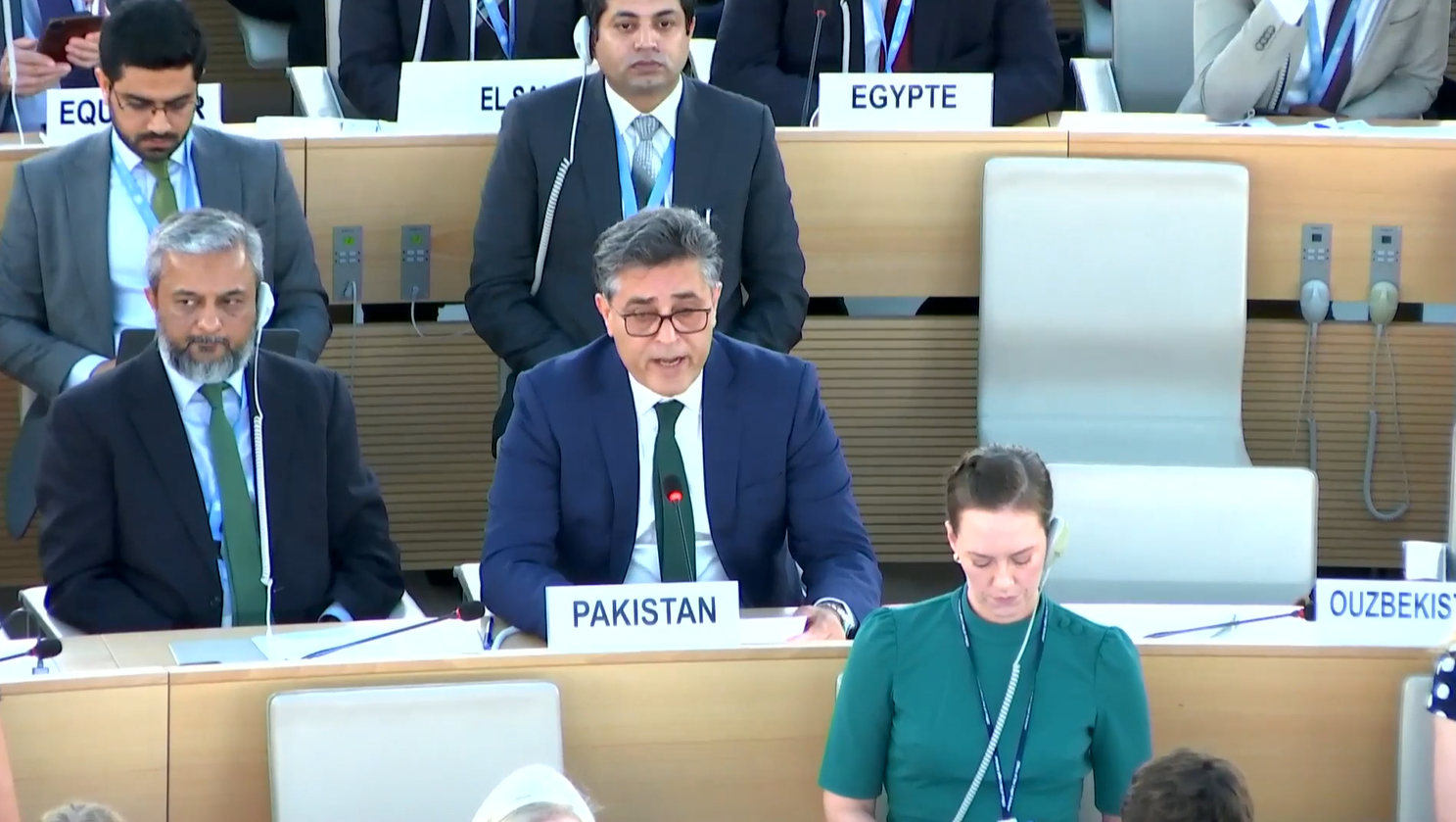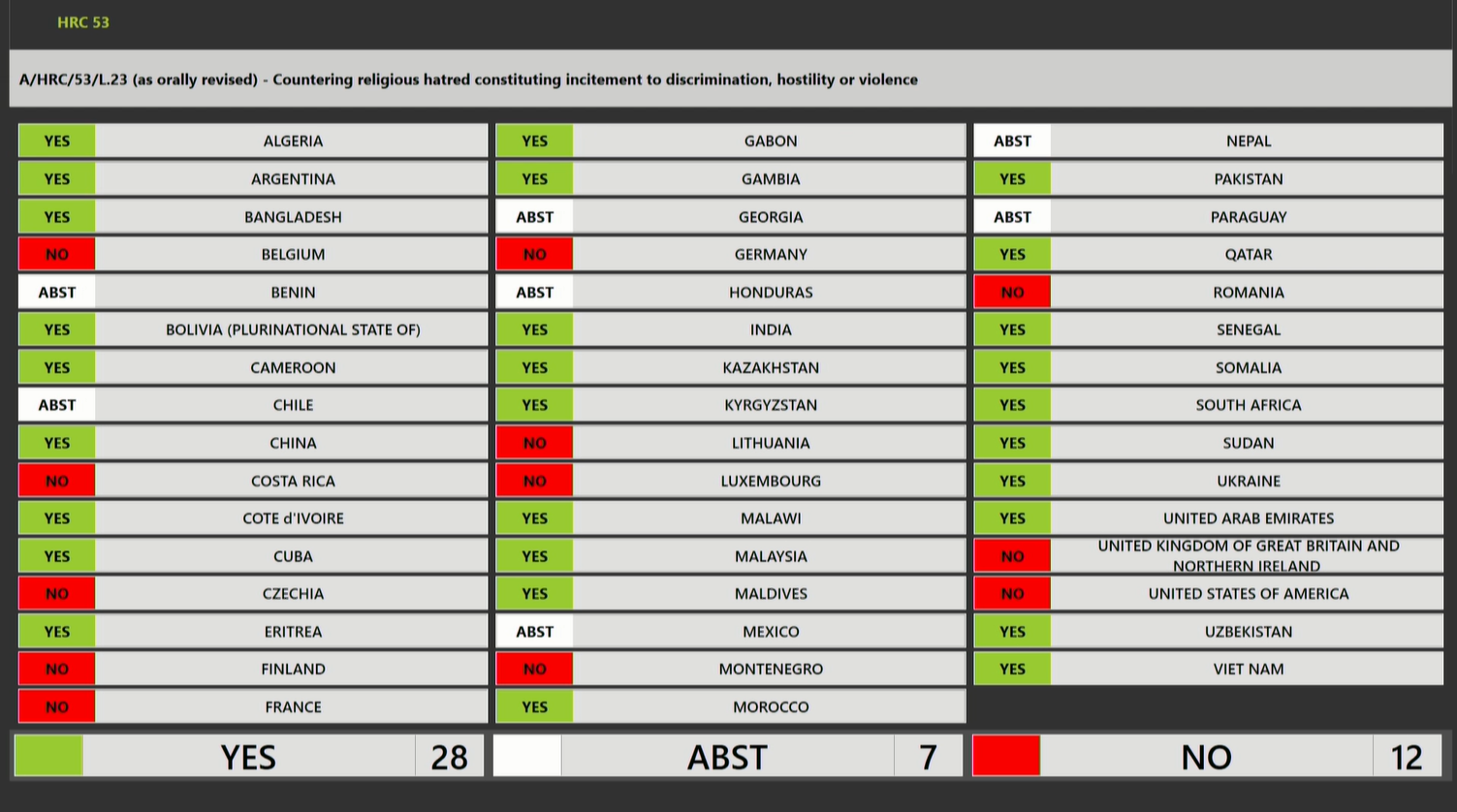53rd session of the Human Rights Council
19 June – 14 July 2023
Item 1: Urgent debate to “discuss the alarming rise in premeditated and public acts of religious hatred as manifested by recurrent desecration of the Holy Quran in some European and other countries"
11th July 2023

By Luísa Barbosa / GICJ
The clash between the human right to freedom of speech and to freedom of religion was the object of debate at the Urgent Debate to “discuss the alarming rise in premeditated and public acts of religious hatred as manifested by recurrent desecration of the Holy Quran in some European and other countries", held by the HRC on the 11th of July 2023.
Following the request of Pakistan, on behalf of member states of the Organization of Islamic Cooperation (OIC), the HRC held the Urgent Debate to discuss the adoption of a resolution on discrimination based on religion following the latest appalling provocative burning of the Quran committed in Sweden in June 2023. The Resolution urged States to hold the perpetrators of acts of religious hatred to account, condemned any advocacy and manifestation of religious hatred, requested the High Commissioner to present an oral update on the various drivers, root causes and human rights impacts of religious hatred, and decided to organize an interactive panel discussion of experts at its fifty-fifth session on religious hatred and desecration of sacred books and places of worship.
The debate also included the contributions of Mr. Volker Turk, High Commissioner for Human rights, who urged that “people need to act with respect for others - all others.” He unequivocally condemned any and all provocative acts designed to incite hatred towards religion and recalled that hate speech needs to be addressed in all societies and actively countered. Ms. Nazila Ghanea, Special Rapporteur on freedom of religion or belief, also participated. She asserted that blasphemy laws are prohibited under the International Covenant on Civil and Political Rights, with the exception of laws that prohibit any advocacy of national, racial, or religious hatred that constitutes incitement to discrimination (Article 20, ICCPR). Within the framework of clashing human rights, the Special Rapporteur affirmed that freedom of expression and freedom of belief are mutually reinforcing rights and that tolerance is crucial to respecting both rights.
Debate during the session was marked by differing views on how to balance the freedom of speech and freedom of religion. The EU delegate condemned acts of religious discrimination but also remarked that general prohibitions on criticizing religions themselves are a clear violation of ICCPR, advocating against the adoption of the Draft Resolution, which has not achieved consensus in negotiations. France, Germany, and other EU States reiterated the EU statement, adding that human rights protect individuals, not institutions or religions. The USA also expressed its concern over the adoption of the Resolution, relying on the importance of freedom of speech and the lack of consensus on the content of the Draft Resolution.
Pakistan, on behalf of the OIC, stated that no sacred book should be disrespected and that acts of deliberate desecration have been rising, particularly in the European states where burning of the Quran has taken place. The delegate affirmed that this situation violates States’ responsibility to prevent discriminatory acts and reiterated the character of the Draft Resolution, which defends prevention, deterrence, accountability, and redress measures. Cote d’Ivoire, on behalf of the African Group, supported the adoption of the resolution, affirming that the values of African societies go against all forms of religious hatred constituting incitement to violence. The delegate maintained that both the ICCPR and CERD place obligations on States to counter the dissemination of ideas based on hate, as well as all acts of violence or incitement of violence. Lastly, he recalled that religious hatred fortifies stigmatization and asserted that, if left unchecked, it can harm peace and development, as it lays the foundation for serious human rights violations.
During this debate, GICJ delivered three joint oral statements.
Alongside Association Ma’onah for Human Rights and Immigration, GICJ affirmed that the problem resides less in individuals expressing their hate, but rather it is in political leaders who inspire this hate, highlighting that in too many cases, political leaders fuel hatred through public channels, sharing to a wide audience false ideas or biassed attacks against religions. We encouraged States to prioritise education, youth and intercultural dialogue to foster trust between communities.
(click here to watch the full statement)
Jointly with Union of Arab Jurists, GICJ condemned the worsening of Islamophobia worldwide and denounced the complacency of some governments that allow hate speech under the justification of freedom of expression. We remarked that freedom of expression should not be used to violate human rights values.
(click here to watch the full statement)
GICJ also delivered a joint statement with EAFORD, asserting that a forward-looking text that disallows freedom of expression to be used for denigration of religions is what is needed. We implored the Council to put the 2019 UN Strategy and Plan of Action on hate speech into effect.
(click here to watch the full statement)
The vote of the draft Resolution was marked by the lack of consensus for its adoption. Ultimately, Resolution 53/23 on countering religious hatred constituting incitement to discrimination, hostility or violence was adopted by 28 votes in favor, with 7 States abstaining and 12 voting against it.

Geneva International Centre for Justice (GICJ) welcomes the adoption of the Resolution and hopes that it will spark dialogue on combatting all forms of religious hatred - a systemic human rights issue which is increasing in frequency and intensity around the world. GICJ reiterates that everyone has the responsibility to exercise their speech in a way that is truthful, respectful and which does not provoke hatred and mistrust. We, thus, urge States to take the necessary measures to combat religious hatred to promote greater understanding of the need to respect fundamental tenants of religious believers and to foster dialogue to increase tolerance in society. This becomes more and more important as we live in an ever increasingly interconnected world.







